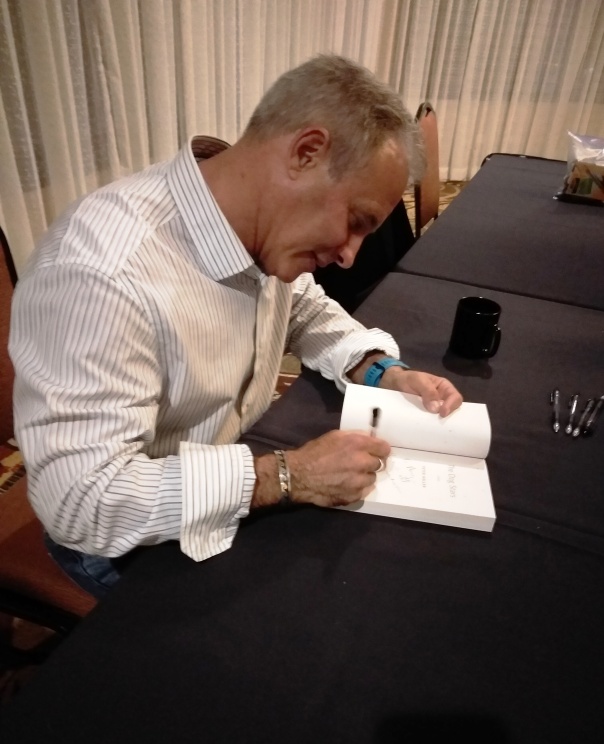Writing and trying to get published can be like climbing a sheer ice cliff.
That’s the takeaway I got from Fort Collins, Colo., author Jim Davidson’s closing speech May 5 during the 13th annual Northern Colorado Writers Conference “Much Ado About Writing” at the Fort Collins Marriott.
Davidson told the back story of his memoir, “The Ledge: An Inspirational Story of Friendship and Survival,” published in 2011, which he co-authored with investigative journalist Kevin Vaughan. He wanted to encourage the more than 100 writers who attended the two-day conference to persevere in order to reach their goals of writing and publication.
“By challenging yourself, you’ll find a better version of you,” Davidson said.
At the Ledge
“The Ledge” tells Davidson’s story of surviving being trapped 80 feet inside a glacial crevasse. In 1992, Davidson and his best friend, Mike Price, stood atop Washington’s Mount Rainier at the end of their climb when a cave-in dropped them onto a narrow frozen shelf of crumbling ice and snow in a pitch-black ice wall.
Price died in the tragedy, and Davidson had to fight to escape, coming up with an immediate tactical plan and using his few tools to slowly climb out to sunlight.
Davidson didn’t give up climbing despite the setback. He is a high-altitude climber and expedition leader for more than 35 years who scaled mountains worldwide, including Mount Everest and peaks on five continents. He survived earthquakes and avalanches on Mount Everest in 2015 and helped conduct multiple rescues of climbers. Previously, he worked as an environmental geologist and science writer with 40 publication credits.
“When things go wrong, how will you respond?” Davidson asked the other writers at the conference.
Finding Resilience
Davidson defined resilience as bouncing back from challenges and learning from mishaps. Normal reactions can include fear, doubt, dread, inaction, insecurity, anxiety and exhaustion when change occurs but may not be what is wanted or desired, he said.
“Plain old-fashioned perseverance … is a slow grinding process,” Davidson said. “It’s tiring, and you may have doubts.”
Davidson said personal resilience occurs through accepting that change occurs and doing something about it. It’s embracing the challenges, persevering through uncertainties, redefining the self and coming up with new techniques.
Davidson’s book from the accident in 1992 to publication took 19 years. He met Vaughn, a writer for the former “Rocky Mountain News,” at the Northern Colorado Writers Conference in 2007, and Vaughn wanted to do a news series about him, which later became a book project.
Davidson provided an outline of his writing experiences: from 1992 to 1995, he’d journaled and did some early writing. From 1996 to 2002, he made no progress. From 2003 to 2007, he spoke about his experiences. And from 2008 to 2011, he worked with Vaughan on the book.
Becoming Stronger
Davidson learned how to take a horrible life event and turn it around. He became stronger and instead of PTSD, he experience PTG, or post-traumatic growth.
“It doesn’t make the trauma go away,” Davidson said, adding that he still struggles with the “mess and the meaning.”
Davidson forged a new reality out of what had happened to him and distilled it down into a few lessons.
“Try to help somebody else learn from your experience,” Davidson said.
I definitely did learn from Davidson’s experience, walking away from his speech motivated to climb to my publication goal, no matter what it takes. I’d hate to give up now. I, too, have had my almost 19 years.
I wrote my first novel in 2000 and have since written a few. I’ve written a hundred short stories. I’ve had a few publications but not the big climb of traditional publishing. I’m still working on that goal keeping resilience and perseverance in mind.


